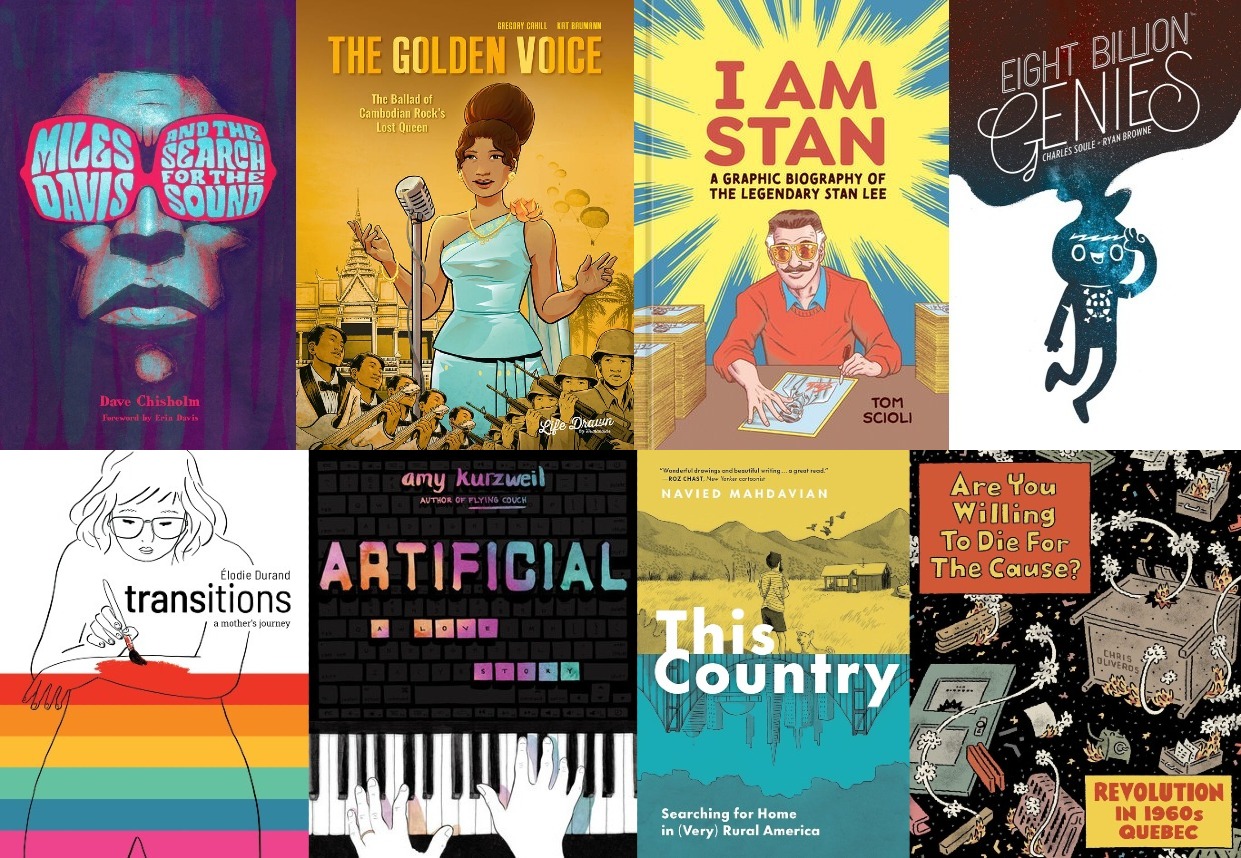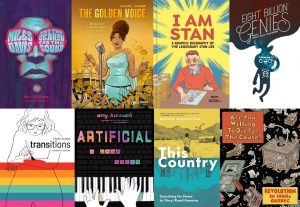
7 must-read nonfiction graphic novels
Comparing something to a comic book isn’t usually meant as praise, but comics, animation and graphic novels can do things other art forms can’t.
I remember watching a roundtable discussion with some former writers for “The Simpsons,” and one of them commented that since it cost the same to draw 50 helicopters as it does to draw Homer on the couch, the writing staff could let their imaginations go wild in a way they couldn’t in other types of TV or film.
That kind of creative freedom is also evident in nonfiction graphic novels we’re focusing on this week (and there’s one fiction book included, too, for those who like their stories made-up). Not only will you find a range of visual styles – some books explode with color and imagery, others stick with clean black & white lines – but the stories unfold in distinctive ways as well.
I’ve been gathering graphic novels to share as we approach the holidays and end of the year. Maybe you need gift ideas for older comics fans, or just want to read something different from your usual format of choice. (A bonus: The nonfiction titles generally have excellent bibliographies, so there are plenty of recommendations for further reading.)
Whatever the case, you’re covered. Read on for some recent books that tell complex, compelling and, yes, even comic book stories.
“Are You Willing to Die for the Cause? Revolution in 1960s Quebec” by Chris Oliveros (Drawn & Quarterly)
I didn’t know anything about the radical 1960s-era Quebec separatist movement known as FLQ, but this book lured me in from the first page. Oliveros, the founder of the Montreal publishing company Drawn + Quarterly, tells the story of passionate, often inept, revolutionaries with intelligence, humor and a focus on the human cost of the conflict. With a compelling narrative and clever, deadpan art – masterfully adjusting perspectives to create a sense of movement even in seemingly static conversations – Oliveros can deliver an emotional gutpunch, too. There’s another volume in the works; I’m looking forward to it.
“Artificial: A Love Story” by Amy Kurzweil (Catapult)
In this mix of memory, family, art and information, New Yorker cartoonist Kurzweil explores connections between herself and her father – the futurist and inventor Ray Kurzweil who she calls “the most interesting person I’ve ever met, the most determined and also the most generous” in the book’s acknowledgments. Then there’s her late grandfather, Fred, a Jewish musician who escaped Nazi Germany and came to America, and Ray’s desire to create a chatbot based on him. Memory, both human and digital, plays a major part in the book. The illustrations draw you in; the words are pretty great, too.
“Eight Billion Genies” by Charles Soule and Ryan Browne (Image Comics)
Like a thought experiment that keeps unfolding, this 8-comic collection (which is the bonus fictional item of this otherwise nonfiction list) looks at the cascading ramifications suggested by its title: What if 8 billion genies – who look a bit like magical Pillsbury Doughboys – appeared and offered to grant everyone one single wish? The pitfalls that arise from requests for cash, fame or love quickly become apparent, and the characters, who range from the patrons of a Detroit bar to the president of the United States, soon realize the myriad ways other people’s desires impact your own.
“The Golden Voice: The Ballad of Cambodian Rock’s Lost Queen” by Gregory Cahill and Kat Baumann (Humanoids)
Raised on a rice farm, Cambodian singer Ros Serey Sothea found success in the 1960s after audiences heard her at a public concert. Later known as The Queen with the Golden Voice, she’s said to have recorded something like 500 songs during her brief career; many recordings were lost or deliberately destroyed, but the book has a curated playlist of her music. Following Cambodia’s bloody civil war – in which she trained as a paratrooper – it’s believed she was sent to a labor camp and died in the killing fields, one of nearly 2 million murdered, or nearly a quarter of the country’s population, in the genocide orchestrated by Pol Pot.
“I Am Stan: A Graphic Biography of the Legendary Stan Lee” by Tom Scioli (Ten Speed Graphic)
In Scioli’s follow-up to his book about comics legend Jack Kirby, readers zip through the life of Kirby’s sometime partner, sometimes adversary Stanley Lieber, aka, Marvel Comics icon Stan Lee. The story spans decades as the comic business booms, busts and blooms into a behemoth. You might often wish for a little more backstory if you don’t already know Lee’s history beyond his cameos in MCU movies, but as an overview of this towering, sometimes controversial, figure, it’s time well spent.
“Miles Davis and Search for Sound” by Dave Chisholm (Z2 Comics)
This is a terrific book. Basing the text on jazz great Miles Davis’s interviews, essays and biography, Dave Chisholm – who, like Davis, is a trumpeter – wrote, drew, colored and lettered this richly illustrated and researched biography of one of the 20th century’s greatest musicians. Colorful and clever, Chisholm’s work displays an improvisor’s imagination – he inserts a panel of a melting Charlie Parker in the style of Salvador Dali during an aside on surrealism – switching up the look and palette of the panels and pages to best suit the story’s needs.
“This Country: Searching for Home in (Very) Rural America” by Navied Mahdavian (Princeton Architectural Press)
Cartoonist Mahdavian and his filmmaker wife Emelie left San Francisco with their dog to live in a tiny house in remote Idaho. The transition was not easy for a variety of reasons. A wonderful storyteller and artist – as well as a reader of Robert Macfarlane – Mahdavian deftly uses a clean, expressive style as he shares moments out in nature, running a movie theater and interacting with the locals. He teases out the humor and stress of this relocation, as well as a sense of what it’s like to be the child of Iranian immigrants in rural America.
“Transitions: A Mother’s Journey” by Elodie Durand (Top Shelf)
“Transitions” follows the journey of university biologist Anne Marbot, a mother whose child comes out as a trans man, Alex. Confused, curious and believing herself committed to her child’s well-being, Anne is unwilling to accept change and alienates Alex with her continued resistance. Grappling with her feelings of loss and more and more at odds with her child, Anne eventually finds her way to a place of understanding. It’s a powerful story, and the book includes nonfiction interludes that explain and enlighten as it goes along.
Have you read any books – and that includes graphic novels – that you want to tell people about? Email me at epedersen@scng.com with “ERIK’S BOOK PAGES” in the subject line and I may include your comments in an upcoming newsletter.
And if you enjoy this free newsletter, please consider sharing it with someone who likes books or getting a digital subscription to support local coverage.
Thanks, as always, for reading.


